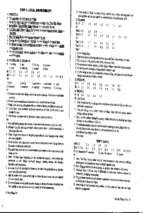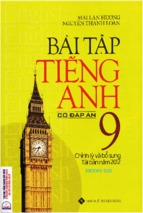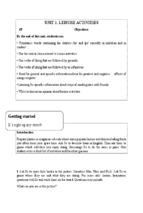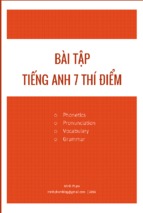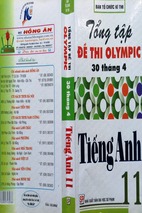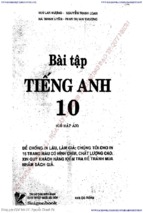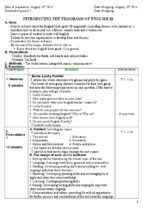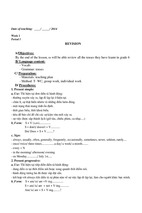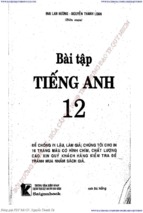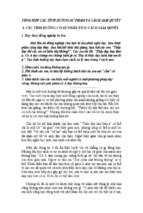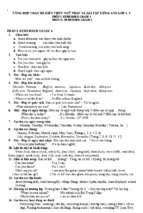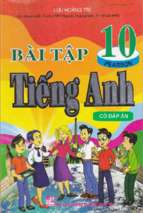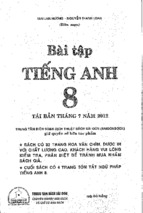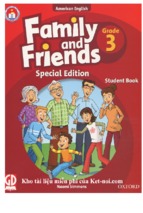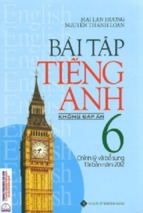BỒI DƯỠNG THI HỌC SINH GIỎI TIẾNG ANH LỚP 9
1. SUBJECT & VERB AGREEMENT
*Special notes: Cần chú ý chia động từ hòa hợp với chủ từ (danh từ) theo các quy tắc sau:
1. Noun phrases có dạng (N1)-(N2)
chia theo (N1)
Ex: The study of languages is interesting.
2. (S1)
as well as (cũng như là)
(S2)
together with
chia theo (S1)
along with
accompanied by (được áp dụng với)
Ex: The actress, along with her manager and some friend is going to the party.
3. Either
(S1) or (S2)
chia theo (S2)
Neither
nor
Ex: Neither John nor his friends are going to school today.
4. Either
(S)
Neither
Ex: Neither of his pen is able to use.
chia Vít
5. Each/ Every (Nít)
Ex: Each boy and girl has a text book.
chia Vít
6. Đại từ bất định: someone, nobody, everybody ...
Ex: No one is here.
chia Vít
7.- Khoảng thời gian, tiền bạc, khoảng cách…
- News, physics, maths…
- Army, police, cattle, poor…
Ex: 5,000 dollars is not for us.
chia Vít
chia Vnhiều
8. No/ None
Nít
Nnhiều
Ex: None of students have got finished the test yet.
chia Vít
chia Vnhiều
9. The number of (Nnhiều)
A number of (someone / Nnhiều)
chia Vít
chia Vnhiều
1
Ex: The number of days in a week is 7. A number of hours in a day are 24.
2. PASSIVE VOICE
*Special notes:
1.Mệnh đề chính thường gặp: say (said), think (thought), believe, report…(+clause)
Ex: 1. People say the price of gold is going up.
It is said the price of gold is going up
The price of gold is said to be going up.
2. They thought Mary had gone
Mary was thought to have gone.
*Nếu ở 2 mệnh đề bị lệch thì cần dùng have + V3
2. Đối với các (V) tri giác: notice, smell, feel, watch, see, hear, make, let… (+V-ing/ bare inf)
Ex: 1. I saw her come in.
She was seen to come in
2. He let me go out.
I was let to go out
*Dùng to-inf sau các (V) tri giác
3. Đối với các (V) sai khiến: advise, ask, beg, order, urge… (+clause)
Ex: He advised me to put my money in the bank.
He advised me my money should be put in the bank.
*Giữ nguyên các (V) sai khiến, chỉ thay đổi cấu trúc trong mệnh đề sau đó.
4. Thể truyền khiến: (A) Have S.O do S.T (P) Have S.T done by S.O
Ex: I have Paul repair my bike.
I have my bike repaired by Paul.
5. Câu mệnh lệnh: Dùng cấu trúc Let + O + be + V3 trong câu bị động.
Ex: Write your name here.
Let your name be written here.
6. Nếu (S) chỉ vật thì không dùng by mà dùng with.
Ex: Smoke filled the room.
The room was filled with smoke
2
3. CONTINOUS
Verbs
Được chia ở tiếp diễn
Không được chia ở tiếp diễn
1. feel
(sờ)
I’m feeling a table.
(+ (that) clause)
I think he is a nice boy.
(cảm thấy)
I feel tired.
( + off : đưa tiễn)
I was seeing off at the airport.
(ngửi)
I’m smelling the roses.
(nhìn thấy)
I saw her in the library.
(cảm giác một mùi hương)
This soup smells good.
(kết hợp một cụm từ mang nghĩa khác)
I’m having a shower.
(có, sở hữu)
I have a dog.
(kết hợp pre: at, for…)
He’s looking for a house.
(cư xử)
He’s being as he is a boss.
(trông có vẻ)
You look more beautiful.
(thì, là, ở)
I am a student.
2.think
(nghĩ về ai,
điều gì đó)
I’m
thinking of
him
3.see
(cảm giác
một mùi
vị)4.smell
This disk
tastes awful.
6.have(nếm)
I’m tasting
this soup.
5.taste
7.look
8.be
4. WISH CLAUSE
S1 + WISH + S2 + V
IF ONLY
1.Present wish: S1 + wish + S2 + V (past subj)
Ex: He isn’t here now. I wish he were here now.
2. Past wish: S1 + wish + S2 + V (past perfect: had + pp)
Ex: I didn’t go to Vung Tau last week. I wish I had gone to Vung Tau last week.
3. Future wish: S1 + wish + S2 + could/ would + V (B.I)
Ex: You won’t come here soon. I wish you would come here soon.
3
*Special notes (đối với TH3)
- S2 là I, we V2 : could + B.I
Ex: She wishes I could come here soon.
-S1 = S2 V2 : could + B.I
Ex: He wishes he could come here soon.
-Mệnh lệnh, phàn nàn, bực mình: V2 : would + B.I
Ex: You’re always talking in class. I wish you wouldn’t talk in class.
5. CONDITIONAL SENTENCES
1. Real condition (type 1)
If clause:
present simple
Main clause:
future simple: việc sẽ xảy ra.
Ex: If the weather is good, I’ll play football.
present simple: sự thật hiển nhiên. Ex: If you pour oil to water, it floats.
(can/ may)+ B.I: mệnh lệnh.
Ex: If you need her phone number, ask me.
2. Unreal in the present condition (type 2): ngược lại, trái với sự thật ở hiện tại.
If clause:
past subj
Main clause:
would/ could/ might + B.I
Ex: If he were here, I would take him to the cinema.
3. Unreal in the past condition (type 3): muốn chuyện không xảy ra, không có thật trong quá khứ.
If clause:
had + pp
Main clause: would have + pp
Ex: If the weather had been good yesterday, I would have gone to the movie.
*Special notes: Mixed condition
Ex: 1. He is not a good student, so he took part in the flight last night.
If he were a good student, he wouldn’t have taken part in the flight last night.
2. My father drank so much wine, so he feels tired.
If my father hadn’t drunk so much wine yesterday, he wouldn’t feel tired.
6. REPORTED SPEECH
*Special notes:
1. deny (từ chối) : + V-ing
+ (that) clause
Ex: “No, it isn’t true. I didn’t steal that money’
He denied he hadn’t stolen that money.
stealing that money.
4
2. suggest (đề nghị):
+ V-ing
+ (that) clause
S + B.I
S + should + B.I
Ex: “If I were you, T would take a rest”
He suggested
I (should) take a rest.
taking a rest
3. offer (đề nghị ) + to-inf
Ex: “Let me carry your suitcases, Mary”
He offered to carry Mary’s suitcases.
4.offer (mời) + SO + STH
Ex: “A cigarette?”
He offered me a cigarette.
5. advise (khuyên) SO + to do + STH
Ex: “You had better go to the dentist”
My mother advised me to go to the dentist.
6. apologise/ apologize (xin lỗi) + to SO + for doing + STH.
Ex: “I’m awfully sorry, Jack. Because I have broken your bike”
She apologized to Jack for breaking his bike.
7. Remind (nhắc nhở) SO to-inf
Ex: “Don’t forget to do your homework”
The teacher reminded his students to do their homework.
8. Admit
+V-ing
(thừa nhận) + (that) clause
Confess
+V-ing
Ex: “That’s right. I stole that money”
He admitted stealing that money
that he had stolen that money.
confessed stealing that money
9. Doubt (nghi ngờ) + (that) if/ whether + clause
Ex: “I don’t think Liverpool will win”
He doubted whether Liverpool would win.
5
10. Accuse (buộc tội) + SO + of doing + STH
Ex: “You murdered your father”
The judge accused him of murdering his father.
11. Other structures: agree/ refuse/ decide/ promise/… + to-inf
7. TAG QUESTIONS
*Special notes:
1.Câu khẳng định có các trạng từ phủ định câu phủ định: never, at no time, rarely, seldom,
hardly, no longer, by no mean, hardly ever,…
Ex: He never goes to school late, does he?
2. Các câu có chủ từ là no one, nothing, nobody câu phủ định
Ex: No one came to the party last night, did they?
3. Nếu chủ ngữ là someone, everybody, nobody, no one,… they
Ex: Everyone likes it, don’t they?
4. Nếu chủ ngữ là nothing/ this, that it
Ex: Nothing is impossible, is it? / This is your chair, isn’t it?
5. Nếu chủ ngữ là there there
Ex: There is a big tree, isn’t there?
6. Nếu chủ ngữ là I am aren’t I?
Nhưng I am not am I?
Ex: I am stupid, aren’t I?
7. Câu đề nghị có Let’s shall we?
Ex: Let’s go to the movie, shall we?
8. Câu mệnh lệnh khẳng định can/ could/ will/… you? và ngược lại
Ex: Read this passage, can you?
9. Sử dụng ý kiến của người nào đó thêm think ở phần đuôi.
Ex: These pictures are good, don’t you think?
6
10. Cảnh báo, nhắc nhở, khuyên nhủ, mong ước will/ won’t you?
Ex: Don’t forget to lock the door, will you?
11. Trong văn nói, người ta có thể dùng Yes/ No/ OK/ Right trong Tag Questions.
Note:
-Chủ ngữ trong câu hỏi đuôi lúc nào cũng chuyển thành đại từ.
Ex: Lan is a doctor, isn’t she?
-Phần động từ, trợ động từ + not trong câu hỏi đuôi được viết ở hình thức là viết tắt (n’t).
Ex: You met her at the airport, didn’t you?
8. COMPARISONS
1.So sánh bằng:
as + Adj/ Adv + as
not as (so) + Adj/ Adv + as
the same + N + as
like
similar to
different from
Ex: He is as tall as I
Ex: He is not so clever as I.
Ex: This room is the same length as that one.
Ex: She is a bit like her sister.
Ex: The motel is similar to the hotel.
Ex: Pens are different from pencils.
2.So sánh hơn, so sánh nhất
-Tính từ ngắn là những tính từ có 1 âm tiết và 2 âm tiết trừ những tính từ có tận cùng là
(-ed, -ing, -ous, -ish, -less,..)
- Tính từ dài là những tính từ có 3 âm tiết trở lên và 2 âm tiết có tận cùng là (-ed, -ing, -ous, -ish,
-less,..)
Ex: tired, boring, cheerful, careless, nervous, reddish, …
3. So sánh kép
The + (so sánh hơn) … , the + (so sánh hơn) + ... (càng… càng)
(so sánh hơn) + AND + ( so sánh hơn)… (càng, ngày càng)
Ex: The older she is, the more beautiful she gets.
The earth is getting hotter and hotter.
9. INVERSION
Đảo ngữ: trật tự từ trong câu là câu hỏi. Chỉ được phép đảo ngữ trong các trường hợp sau:
7
1.Có các trạng từ phủ định: never, at no time (không bao giờ), hardly, scarcely (vừa mới), little
(hầu như không), no where (không nơi nào), no longer (không còn nữa)
Ex: He no longer smokes.
No longer does he smoke.
2. Có in/ under no circumstance (dù hoàn cảnh nào đi nữa), in no account (dù lí do gì đi nữa)
Ex: You mustn’t reveal this secret in no account.
In no account mustn’t you reveal this secret.
3. Có hardly … when, no sooner … than (vừa mới … thì)
Ex: He had no sooner entered the room than it began to rain.
No sooner had he entered the room than it began to rain.
4. Có not ony… but also (không những… mà còn)
Ex: This room is not only small but also dark.
Not only is this room small but also dark.
5.Bỏ “if” trong câu điều kiện (chỉ đối với trường hợp có were, should, had)
Ex: If I had met you before, we may have been friends.
Had I met you before, we may have been friends.
6. Có so… that
Ex: I was so tired that I can’t work more.
So tired wes I that I can’t work more.
7. Có here, there trong câu cảm.
Ex: The bus comes here!
Here comes the bus!
8. Particle
Ex: The rain came down.
Down came the rain.
9.Có trạng từ thời gian (Vmovement + S)
Ex: A big tree stands in a middle of the school yard.
In the middle of the school yard stand a big tree.
10. Có not until
Ex: He didn’t begin to read until later.
Not until later did he begin to read.
8
11. Có “only” đầu câu không phụ nghĩa cho chủ từ (only + rarely, when, then, by, later…)
Ex: You will succeed only by working hard.
Only by working hard will you succeed.
10. TO-INF OR GERUND
1.Chấp nhận theo sau là to-inf và gerund mà nghĩa không thay đổi:
begin, start, continue, intend, prefer + to-inf / gerund
2. Chấp nhận theo sau là to-inf hoặc gerund mà nghĩa thay đổi
A. like/ love/ hate/ dislike
B. try + to-inf (cố gắng)
Ex: I try my best to do this exercise.
+V-ing (thí nghiệm, thử) Ex: I try wearing the new jeans but it doesn’t fit me.
C. stop
+ to-inf (ngừng để làm gì) Ex: I stop my car to buy a newspaper.
+V-ing (ngừng hẳn)
Ex: I stop reading newspaper because it’s so noisy.
D. mean
+ to-inf (dự định, muốn) Ex: I mean to study abroad.
+V-ing (ám chỉ)
Ex: It means working with him very hard.
E. go on
+ to-inf (làm một việc khác mới) Ex: I go on to do my test after come back home.
+V-ing (tiếp tục)
Ex: She goes on talking.
F. allow, forbid, advise, encourage, permit, suggest
G. remember/ regret/ forget
+ object + to-inf
+ V-ing
+ V-ing (đã làm gì)
+ to-inf (sẽ làm gì)
3. Bắt buộc theo sau là V-ing:
After prepositions
After these verbs
1.admit
(công nhận)
3.appreciate
(đánh giá )
5.carry on
(mang theo)
7.defer = delay
(làm trì hoãn)
9.detest= dislike = hate
(ghét)
11.enjoy
(thưởng thức)
13.excus
(tha lỗi)
15. give up
(từ bỏ)
2.anticipate
4.avoid
6.consider
8.deny
10.dread
12.escape
14.fancy
16.imagine
(dự tính)
(tránh xa)
(xem xét)
(phủ nhận)
(sợ)
(trốn thoát)
(mong muốn)
(tưởng tượng)
9
17.finish
(hoàn thành)
18.forgive
(tha thứ)
19.involve
(liên quan đến)
20.keep (on)
(tiếp tục)
21.loathe
(ghê tởm)
22.miss
(nhớ, lỡ)
23.postpone
(hoãn lại)
24.practise
(thực hành)
25.prevent
(ngăn ngừa)
26.propose
(đề nghị)
27.put off
(làm chậm lại, hoãn lại) 28.recollect
(hồi tưởng lại)
29.resent
(phẫn nộ)
30.resist
(kháng cự )
31.save
(cứu, tiết kiệm)
32.understand
(hiểu)
33.bear
(mang)
34. omit
(bỏ sót)
35.force
(ép buộc)
After these expressions:
to have difficulty
(có sự khó khăn)
to be worth
(đáng)
to be busy
(bận)
to fell like
(cảm thấy yêu thích)
a waste of
(lãng phí vì)
spend time / hour
(dành thời gian)
waste time
(phí thời gian)
to have a good time / fun / trouble (có thời gian đẹp/ niềm vui /sự lo lắng)
can’t bear =can’t stand (không thể chịu đựng)
can’t help =can’t face
(không thể không)
it’s no use / good
(chẳng ích gì)
it’s (not) worth
(không đáng)
4. Bắt buộc theo sau là to-inf:
1.agree
(đồng ý)
3.appear
(có vẻ)
5.ask
(yêu cầu)
7.beg
(van xin)
9.can’t wait
(ước ao làm gì)
11.claim
(yêu cầu)
13.demand
(đòi hỏi)
15.dare
(dám)
17.expect
(mong chờ)
19.guarantee
(bảo đảm)
21.learn
(học tập)
23.hope
(hy vọng)
25. plan
(vạch kế hoạch)
27.pretend
(giả vờ)
29.prove
(chứng tỏ)
31.seem
(có vẻ)
2.aim
(nhắm đến)
4.arrange
(sắp xếp)
6.attemp
(cố gắng)
8.can’t afford
(không đủ sức)
10.choose
(chọn)
12.decide
(quyết định)
14.desire
(ước ao)
16.deserve
(xứng đáng)
18.fail
(không thể)
20.happen
(tình cờ)
22.help
(giúp đỡ)
24.offer
(ngỏ ý)
26.prepare
(chuẩn bị)
28.promise
(hứa)
30.refuse
(từ chối)
32.tend
(có khuynh hướng)
10
33.threaten
35.undertake
37. wish
39.urge
(đe dọa)
(đảm trách)
(ước)
(cổ vũ)
34.turn out
36.want
38.volunteer
40.manage
(hóa ra)
(muốn)
(tình nguyện)
(tìm cách)
11.OTHER STRUCTURES
1.would rather (tốt hơn là)
had better
A. would rather (not) + B.I 1 + than + B.I 2
Ex: You’d rather stay at home than go out.
B. would rather + S + V2 -clause (2) ở hiện tại thì V2 ở past subj
-clause (2) ở quá khứ thì V2 ở past perfect.
Ex: I would rather you hadn’t gone to Da Lat last week.
C. Had better + B.I
2. It’s time/ It’s high time/ It’s about time + S + V2 (ở simple past)
It’s time for + O + + to-inf
Ex: It’s time we caught the bus. It’s time for us to catch the bus.
3.This is the first time + S + V2 (ở present perfect)
This was the first time + S + V2 (ở past perfect)
The first time + S + V2 (ở present perfect) + is + khoảng thời gian
This is the second time + S + V2 (ở present perfect)
Ex: This is the first time I have seen this film.
The first time I have seen this film is 2 years ago.
4.As if (như thể là) + V2 (ở past subj)
Ex: He behaves as if he were a boss.
5. So… that/ Such …that (quá… đến nỗi)
So + Adj/Adv + that…
Such + noun phrase: (a/an) + Adj + N + that…
*Special notes:
-Dùng so…that đối với much, many, little, few
11
Ex: There are so many stars in the sky that we can’t count them on.
-Khi chuyển “so” thành “such” cần chú ý:
So many + N đếm được
So much + N số ít không đếm được
Such + a lot of + N đếm được hoặc không đếm được
So long such a long way
So far such a long time
-Cấu trúc có thể thay đổi như sau: so + Adj + noun phrase + that…
Ex: She is such a beautiful girl that all of us love her.
She is so beautiful a girl that all of us love her.
6. Enough … (for + O) + to-inf
Enough + N
Adj/ Adv + enough
Ex: She is old enough to study there.
7. S1 + be + adj. S2 + can’t / couldn’t + V bare-inf
S1 + be + too + adj + (for + O) + to-inf (quá… không thể)
Ex: These suitcases are too heavy for me to carry to upstairs.
Note:
-Nếu có never, hardly, really, nobody, nothing câu xác định có ý phủ định
- Chuyền nobody, nothing for anybody, for any thing
Ex: The room is very dirty. No one can live in it.
The room is too dirty for anyone to live in.
8. Because/ Because of
Because + clause
Because of + phrase
Ex: She felt unhappy because of her father’s death
She felt unhappy because her father was died.
9. What + is the price of + STH?
How much + be + STH?
How much +do/does+ STH + cost?
Ex: What is the price of this coat? = How much is this coat? = How much does this coat?
10. It’s + one’s duty +to do +STH
Ex: It’s your duty to tidy your room.
11. S + be thought + to-inf
12
S + be + supposed + to-inf
Ex: You were thought to make that mistake.
12. S + be + adj
S + make + O + adj
Ex: He makes me crazy.
13. S + V + time
It + take + SO + time + to-inf
S + spend + time + V-ing
Ex: It takes me 30 minutes to walk to school. I spend 30 minutes walking to school.
14. Compound adj (tính từ ghép)
Số lượng – N số ít
Ex: She is a twelve-year-old girl.
15. There + is/are + ….+ (giới từ) + (danh từ)
(Danh từ) + has/ have + got +…
Ex: There are a lot of parks in London. London has got a lot of parks.
16. V-ing … + be + adj (+for O)
It + be + adj (+for O) + to-inf
Ex: Learning English is very useful. It is very useful to learn English.
17. Who + do/does + N + belong to?
Whose + N + is/are + it/this/ that/ those/ these?
Ex: Who does this bicycle belong to? Whose bicycle is it?
18. is/ are + (so sánh nhất) + N + (that) hiện tại hoàn thành
Ex: This is the most interesting film I have ever seen.
19. Thể truyền khiến (A)Have/ Get +S.O+do +STH (P) Have/ Get + STH+ done + by S.O
Ex: I have Paul repair my bike. I have my bike repaired by Paul.
20. Despite/ In spite of + noun phrase
(Al)though/ Even though + clause
Ex: They came to the concert though it rained heavily. (=in spite of the heavy rain)
21.No matter + what/ who/ where/ when/ why/ how(adj/ adv) + S + V
Whatever + N + S + V (dù, cho dù)
13
Ex: No matter who you are, I still love you.
Whatever any job you do, you should do it devotedly.
The end
14
- Xem thêm -

